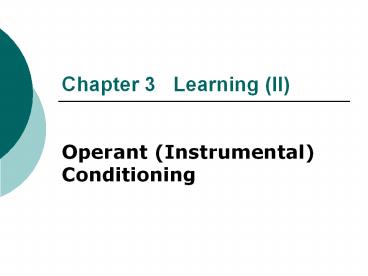Chapter 3 Learning (II) - PowerPoint PPT Presentation
1 / 12
Title:
Chapter 3 Learning (II)
Description:
Chapter 3 Learning (II) Operant (Instrumental) Conditioning Definition A form of learning in which a behavior becomes more or less probable, depending on its ... – PowerPoint PPT presentation
Number of Views:127
Avg rating:3.0/5.0
Title: Chapter 3 Learning (II)
1
Chapter 3 Learning (II)
- Operant (Instrumental) Conditioning
2
Definition
- A form of learning in which a behavior becomes
more or less probable, depending on its
consequences - Respondent behavior
- Operant behavior behavior that operates on the
environment, producing consequences.
3
Skinners Experiment
- Law of effect
- Skinner Box
- Comparison of Classical C. Operant C.
4
Principles of Reinforcement
- Reinforcer
- Positive reinforcer
- Negative reinforcer
- Escape and Avoidance L.
- Primary and secondary reinforcer (conditioned
reinforcer) - Immediate and delayed reinforcer
5
- Delayed gratification
- Learned helplessness
- Overjustification
- Functional autonomy
6
Why do behaviors have been positively reinforced
not occur continually?
- Behavior is controlled by discriminative stimuli,
a process that Skinner calls Stimulus control
(mooncake) - Because the individual has relative degree of
satiation in regard to the reinforcer - response deprivation
7
Shaping and Chaining
- Successive approximations
- Shaping a teacher
- Forward chaining
- Backward chaining
8
Schedules of Reinforcement
- Continuous Schedulesis subjected to repaid
extinction when reinforcement stops - Partial Schedulesbecause they produce
less-predictable reinforcement, they are more
resistance to extinction than are
9
- Fixed-ratio Schedules (FR)
- Variable-ratio Schedules (VR)
- Fixed-interval Schedules (FI)
- Variable-interval Schedules (VI)
10
- Ratio schedules produce faster response rates
than do interval schedules, because the number of
responses, not the length of time, determines the
onset of reinforcement - Variable schedules produce steadier response
rates than do fixed schedules, because the
individual does not know when reinforcement will
occur
11
Punishment
- Two kinds of punishment
- The difference between Punishment and negative
reinforcement - The effectiveness of punishment
- Timing, consistency, intensity
- Using punishment wisely
- Side effects of punishment
- pp. 310-311
12
Application of Operant Conditioning
- In parenting and education
- In the market
- Behavior modification (flooding, systematic
desensitization) - A Clockwork Orange (1971)
- In daily life































